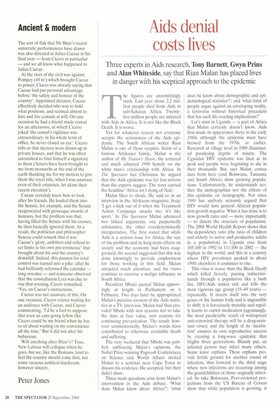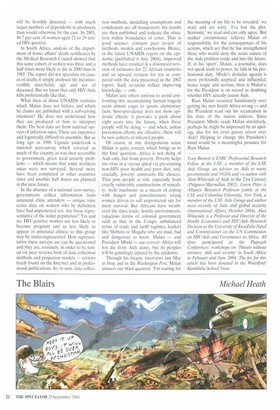Aids denial costs lives
• Three experts in Aids research, Tony Barnett, Gwyn Prins and Alan Whiteside, say that Rian Malan has placed lives in danger with his sceptical approach to the epidemic T, he figures are unremittingly stark. Last year alone 2.2 million people died from Aids in sub-Saharan Africa. Twentyfive million people are infected with Aids in Africa. It is not like the Black Death. It is worse.
Yet for whatever reason not everyone accepts the seriousness of the Aids epidemic. The South African writer Rian Malan is one of those sceptics. Scion of a famous Afrikaner family, Malan is the author of My Traitor's Heart, the tortured and much admired 1990 homily on the white man's relationship with Africa. In The Spectator last Christmas he argued that the Aids epidemic was far less serious than the experts suggest. The story carried the headline 'Africa isn't dying of Aids'.
Malan likes to shock. He said so in an interview in the Afrikaans magazine, Insig: 'I get a kick out of it when the Treatment Action Campaign attacks me; it's like sport.' In The Spectator Malan advanced two linked arguments, one purportedly substantive, the other overdeterminedly interpretative. The first stated that while Aids is a serious issue for Africa, the size of the problem and its long-term effects on society and the economy had been exaggerated; the second suggested that this was done knowingly to provide employment for those working in this field. Malan attracted much attention, and his views continue to exercise a malign influence in South Africa.
President Mbeki quoted Malan approvingly at length in Parliament on 6 February. Two days later he appropriated Malan's putative erosion of the Aids statistics in a TV interview. Malan had thus provided Mbeki with new reasons not to take the data at face value, new reasons for continuing prevarication. The result: however unintentionally, MaIan's words have contributed to otherwise avoidable death and suffering.
The very weekend that Mbeki was publicly embracing MaIan's opinions, the Nobel Prize-winning Pugwash Conferences on Science and World Affairs invited Malan to a seminar near Cape Town to discuss his evidence. He accepted, but then didn't show.
Three main questions arise from MaIan's intervention in the Aids debate: 'What does Malan know about Africa?'; 'what does he know about demographic and epidemiological statistics?'; and 'what kind of people argue against an enveloping reality, a lentivirus without historical precedent that has such life-rending implications?'
Let's start in Uganda a part of Africa that Malan certainly doesn't know. Aids first made its appearance there in the early 1980s although the epidemic must have brewed from the 1970s, or earlier. Research at village level in 1989 illuminated paralysing depths of misery. The Ugandan HIV epidemic was then at its peak and people were beginning to die in their thousands. But, says Malan, census data from here (and Botswana, Tanzania and South Africa) show growing populations. Unfortunately, he understands neither the demographics nor the effects of this epidemic on demography. Not since 1989 has anybody seriously argued that HIV would turn general African population growth negative. What it has done is to slow growth rates and — more importantly — to distort the structure of population. The 2004 World Health Report shows that the dependency ratio (the ratio of children and elderly to active and productive adults in a population) in Uganda rose from 105:100 in 1992 to 111:100 in 2002 the highest in the world; and this in a country where HIV prevalence peaked in about 1990: elsewhere it continues to rise.
This virus is worse than the Black Death which killed fiercely, passing indiscriminately through a population like a bush fire. HIV/Aids makes sick and kills the most vigorous age group (15-49 years) — repeatedly. It inserts itself into the very genes of the human body and is impossible to shift; it is ferociously mutable and rapidly learns to outwit medication (agonisingly, the most predictable result of widespread anti-retroviral therapy will be a drug-resistant virus); and the length of its 'incubation' ensures its own reproductive success by creating a long-wave epidemic that blights three generations. Bluntly put, an infected person may infect many others. Some leave orphans. These orphans provide fertile ground for another round of infection, thus forward to the third stage where new infections are occurring among the grandchildren of those originally infected. So take Botswana. Peer-reviewed projections from the US Bureau of Census show that while population is growing, it will be horribly distorted — with much larger numbers of dependents to producers than would otherwise be the case. In 2003, 49.7 per cent of women aged 25 to 29 tested HIV-positive.
In South Africa, analysis of the department of home affairs' death certificates by the Medical Research Council showed that this same cohort of women was three and a half times more likely to die in 2000 than in 1985. The report did not speculate on causes of death; it simply analysed the incontrovertible data-fields: age and sex of deceased. But we know that only HIV/Aids kills preferentially like that.
What then of those UNAIDS statistics which Malan does not believe and which he claims are published with a self-serving intention? He does not understand how they are produced or how to interpret them. The best data are from national surveys of infection rates. These are expensive and logistically difficult to assemble. But as Long ago as 1988 Uganda undertook a national sero-survey which covered as much of the country as was then accessible to government, given local security problems — which meant that some northern areas were not surveyed. Several more have been completed in other countries since and another half dozen are planned in the near future.
In the absence of a national sero-survey, governments collect information from antenatal clinic attenders — unique time series data on women who by definition have had unprotected sex. Are these representative of the wider population? Yes and no. HIV-positive women are less likely to become pregnant and so less likely to appear in antenatal clinics; so this group may be under-represented. How representative these surveys are can be questioned and they are, routinely, in order to be tested via peer reviews both of data collection methods and projection models — reviews freely found on the Internet and in professional publications. So, in sum, data collec
tion methods, modelling assumptions and conclusions are all transparent; the results are then published and indicate the situation within boundaries of error. That is good science: constant peer review of methods, models and conclusions. Hence, in the latest UNAIDS report on the epidemic (published 6 July 2004), improved methods have resulted in a downward revision of estimates for 22 African countries and an upward revision for ten as compared with the data presented in the 2002 report. Such revisions reflect improving knowledge only.
Malan and others anxious to avoid confronting this accumulating human tragedy seem almost eager to ignore elementary facts. Sero-prevalence does not show epidemic effects: it provides a peek about eight years into the future, when these people will be dying and when, unless prevention efforts are effective, there will be new cohorts of infected people.
Of course in one disingenuous sense Malan is quite correct, which brings us to the final question. Africa is not dying of Aids only, but from poverty. Poverty helps the virus in a vicious spiral via pre-existing non-HIV poor health and poor diet; and, crucially, poverty constrains life choices. That puts people at risk, especially from cruelly vulnerable constructions of sexuality: male machismo as a means of coping with danger and powerlessness; young women driven to sell unprotected sex for mere survival. But Africans have weathered the slave trade, hostile environments, rapacious forms of colonial government such as that in the Congo, unbalanced terms of trade and tariff regimes, leaders like Mobutu or Mugabe who are mad, bad and dangerous to know. Malan — and President Mbeki — are correct: Africa will not die from Aids alone, but its peoples will be grindingly injured by the epidemic.
Through his bizarre interviews last May in Insig and in the Washington Post, Malan answers our third question. I'm waiting for the meaning of my life to be revealed, we read, and are sorry. I've lost the plot. Seriously,' we read and can only agree. But neither circumstance relieves Malan of responsibility for the consequences of his actions, which are that he has strengthened those who would deny the acute nature of the Aids problem today and into the future. If, in his 'sport', Malan, a journalist, does not speak truth to power, he fails in his professional duty. Mbeki's denialist agenda is more profoundly sceptical and influential, hence tragic and serious, than is MaIan's; for the President is on record as doubting whether HIV actually causes Aids.
Rian Malan recanted handsomely over getting the new South Africa wrong — and the President read out his recantation in his state of the nation address. Since President Mbeki reads Malan attentively, perhaps he might be impressed by an apology also for his even graver errors over Aids? Helping to change the President's mind would be a meaningful penance for Rian Malan.
Tony Barnett is ESRC Professorial Research Fellow at the LSE, a member of the LSE Aids Group, an adviser on Aids to many governments and NGOs and co-author with Alan Whiteside of Aids in the 21st Century (Palgrave-Macmillan 2002). Gwyn Prins is Alliance Research Professor jointly at the LSE and Columbia University, New York, a member of the LSE Aids Group and author most recently of Aids and global security (International Affairs, October 2004). Alan Whiteside is a Professor and Director of the Health Economics and HIVIAids Research Division at the University of KwaZulu-Natal and Commissioner on the UN Commission on HIV1Aids and Governance in Africa. All three participated in the Pugwash Conferences' workshops on 'Threats without enemies: Aids and security,' in South Africa in February and Tune 2004. The fee for this article has been donated to the Waterfordl Kamhlaba School Trust.



























































































 Previous page
Previous page